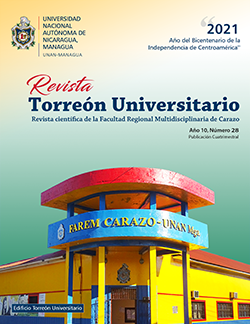Model for the continuity of graduate education in postgraduate training: UNAN-Managua
DOI:
https://doi.org/10.5377/rtu.v10i28.11522Keywords:
model, integration, skills training, research, extensionAbstract
The continuity of postgraduate undergraduate training has the goal of integrating university training, research and extension processes in a coherent sequence, of greater scope and continuity of skills from undergraduate to postgraduate, which allows the linkage and effective development of lines of research at both levels. Therefore, to achieve this, a constructive, recursive, systematic work methodology and inclusive participation of the actors involved is necessary.
To do this, the construction of a model for the continuity of undergraduate and graduate training explains how undergraduate and graduate training can be linked is based on different foundations. Among these are: the methodology to build theoretical models, the country's legal framework, the mission, vision and values of the institution of higher education, as well as concepts and theories related to curricular models that favor the integral development of learning, of research and extension processes.
The different levels of integration (level of integration in the undergraduate degree, level of integration in the integrating axis, research projects (intervention) and level of integration and link with postgraduate degrees), give coherence to the continuity process in which the they link training, research and extension. However, the model is finally materialized in a series of actions that culminate in the improvement of the training of postgraduate programs, taking as a basis the model to develop competencies.
Downloads
Downloads
Published
How to Cite
Issue
Section
License
Los autores que publican en esta revista están de acuerdo con los siguientes términos.
- El autor o los autores de los artículos, ensayos o investigaciones conceden a la Universidad Nacional Autónoma de Nicaragua, Managua (UNAN-Managua) los derechos de edición (copyright) del trabajo enviado, por consiguiente la Universidad cuenta con el derecho exclusivo para publicar el artículo durante el periodo completo de los derechos de autor.
- Estos derechos de autor/ autores autorizan a la Revista Torreón Universitario y a la Universidad editar y divulgar/publicar el artículo en dicha Revista, incluyendo reproducción impresa y electrónica, el almacenamiento, recuperación y cualquier otro tipo de publicación, y fuentes de información secundaria como servicios de resúmenes y bases de datos, así mismo la facultan a proteger el artículo contra el uso no autorizado para su difusión por medios impresos o electrónicos (PDF, HTML, EPUB, XML u otros).
Licencia para el uso del contenido
La revista hace uso de la Licencia Creative Commons Atribución-NoComercial-SinDerivar 4.0 Internacional.
Bajo esta declaración:

Este revista está sujeta a una licencia de Creative Commons Reconocimiento-NoComercial-SinObraDerivada 4.0 Internacional. Puede ser copiada, distribuida y transmitida públicamente siempre y cuando se cite al autor y la fuente (Revista Torreón Universitario), no debe modificarse ni utilizarse con ningún fin comercial. La licencia completa se puede consultar en http://creativecommons.org/licenses/by-nc-nd/4.0/.

